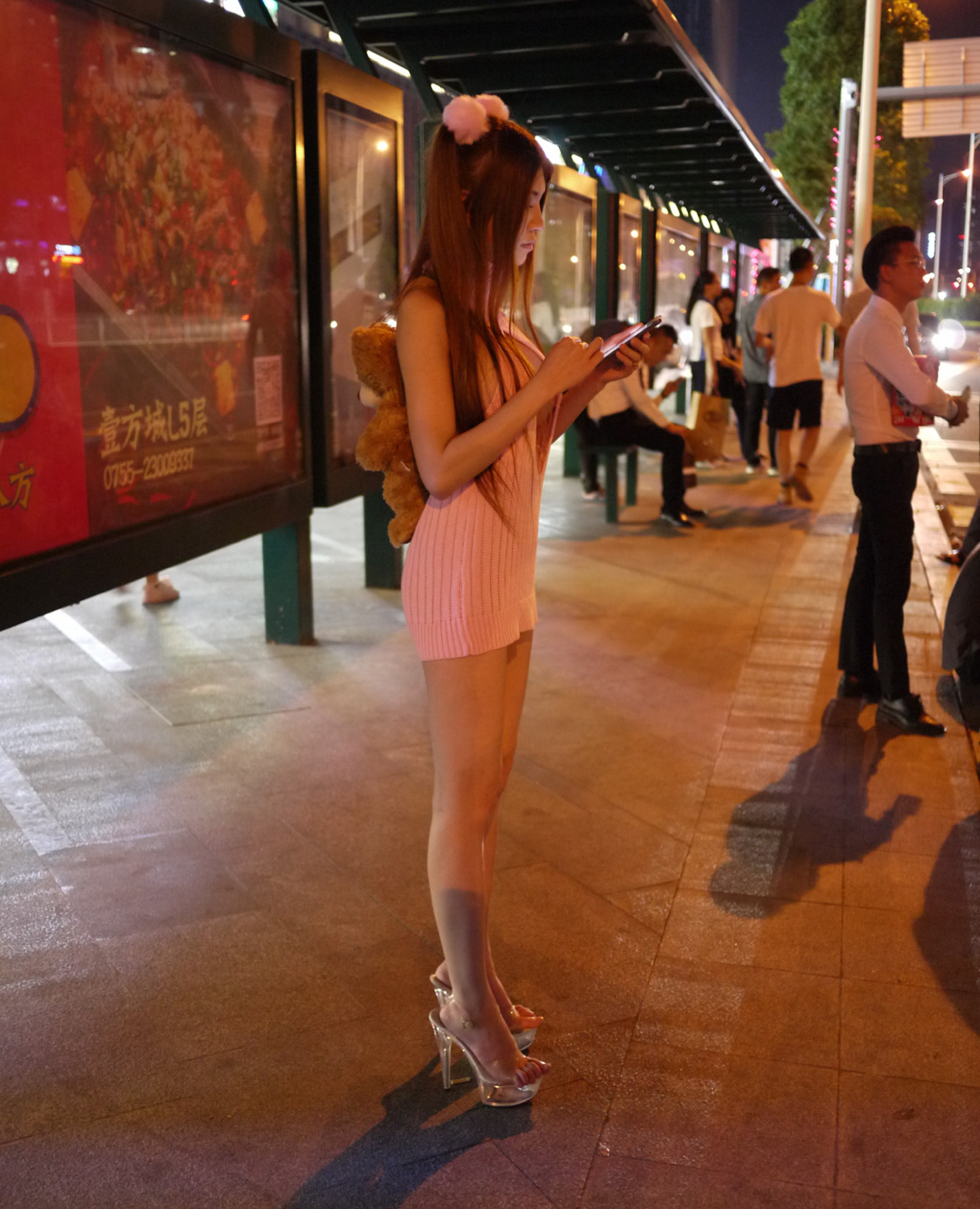Thread
So facial recognition🧵- both as an urban myth and as a reality is a key layer (although not the foundation) of Chinese anti-crime initiatives. Shenzhen is probably the most sophisticated in that regard, and how that pans out can be seen on my Instagram:
www.instagram.com/reallysexycyborg/
www.instagram.com/reallysexycyborg/
I like to say that someone could throw a dart at a map of Shenzhen and it would be safe for me to walk alone there in hotpants anytime day or night. While that's a bit hyperbolic, it's not far from the truth.
A few things converge to make this happen- the reality is that the chances of being caught are quite high, the public perception is both that the state surveillance apparatus is extremely powerful, and that the law will be enforced. These things rarely converge elsewhere.
You have places with highly professional law enforcement but criminals who are convinced they won't get caught, or if they do, they'll get let off. The Chinese state media apparatus has done an impressive job of convincing citizens- you will be caught, you will be accountable.
SZ has an advanced surveillance infrastructure, probably on par with NYC:
en.wikipedia.org/wiki/Police_surveillance_in_New_York_City
en.wikipedia.org/wiki/Domain_Awareness_System
We also have the considerable advantage of warrant-free access to basically everything your cellphone can collect- including extremely precise location data.
en.wikipedia.org/wiki/Police_surveillance_in_New_York_City
en.wikipedia.org/wiki/Domain_Awareness_System
We also have the considerable advantage of warrant-free access to basically everything your cellphone can collect- including extremely precise location data.
Shenzhen, like NYC makes use of this to track dissidents, and prevent attacks by domestic groups and foreign powers- direct challenges to the State.
The interesting difference about China- and Shenzhen in particular, is the emphasis on addressing street-level crime.
The interesting difference about China- and Shenzhen in particular, is the emphasis on addressing street-level crime.
If a "Conservative is just a liberal who has been mugged" it could be argued "a Party critic is just a Party supporter who has been mugged".
Crime- pickpocketing, robbery, subway groping- isn't just a crime against the individual, it undermines the State.
Crime- pickpocketing, robbery, subway groping- isn't just a crime against the individual, it undermines the State.
Street-level crime is clearly against the Party's wishes, so its visible existence is a direct challenge to Party rule- if they can get away with it, maybe the Party is not all-powerful after all? Maybe they aren't the wise guiding hand we were told?
If you read my account you'll know I criticize many things about China, IMHO our social contract is sufficiently broken that like many Chinese in tech I'm considering immigration. But, everyone in Shenzhen has a story about them or a friend who was subject to some minor crime...
...went to the police station, watched while police pulled up the video while they waited, and went and got the guy. There are dozens of stories about people trying to grab and run with demo laptops from electronics stores- only to return home to find the police waiting for them.
We have both the reality of effective law enforcement, and a supporting mythology that acts as a deterrent.
(Sorry but all this is important to understand how surveillance and Face Recognition is used to build support for the Party and to manufacture consent for surveillance.)
(Sorry but all this is important to understand how surveillance and Face Recognition is used to build support for the Party and to manufacture consent for surveillance.)
Part of building this mythology of an all-powerful public security apparatus is frequent news articles on some criminal or another being caught via the "power of face recognition". Usually on outdoor CCTV cameras. This is often incredibly unlikely.
There is no face recognition system in existence that reliably match 1 to 1.4b with street CCTV input. If you had the system look for fugitives without a proper face enrollment camera you'd have false positives a thousand times a day. It's also unnecessary since...
...it's almost impossible to navigate life in China without a smartphone. Which the State has access to on the back end.
This is where geofencing comes in:
en.wikipedia.org/wiki/Geo-fence_warrant
So you can query who was in that location at that time, then run face recognition against them.
This is where geofencing comes in:
en.wikipedia.org/wiki/Geo-fence_warrant
So you can query who was in that location at that time, then run face recognition against them.
Or you can follow a perpetrator on camera for a few blocks, and get geo-fence data for two locations they passed through, run a diff- and the one in both locations is your guy or gal.
Child abducting and child trafficking used to be a huge, huge problem in China- and while a lot of tools were used to nearly destroy the trafficking industry, face recognition is the one most frequently cited:
This build a lot of popular support for it.
This build a lot of popular support for it.
So you create an ongoing mythology of "we caught him with face recognition"- because people can't leave their faces at home. This has of course been updated with stories of systems now working with face masks- whether they actually do with sufficient accuracy is irrelevant.
In reality, it's just a form of parallel construction:
en.wikipedia.org/wiki/Parallel_construction
TLDR, in China, phone tracking is the secret sauce that makes face recognition for law enforcement effective- because then you can reduce the size of the data set you're matching against.
en.wikipedia.org/wiki/Parallel_construction
TLDR, in China, phone tracking is the secret sauce that makes face recognition for law enforcement effective- because then you can reduce the size of the data set you're matching against.
This ties into Chinese privacy concerns (and yes, we do have them) being the inverse of the typical American. We are more trusting of the State having access to this data than corporations, part of this is we have stronger privacy protections when it comes to corporations.
Again, this is because people being scammed, having their data sold, and foreign powers acquiring data on Chinese citizens is an attack against the State:
www.zdnet.com/article/chinas-personal-data-protection-law-kicks-in-today/
www.zdnet.com/article/chinas-personal-data-protection-law-kicks-in-today/
My home face recognition system is probably illegal-ish under the new laws (although enforcement at the consumer level like this is unlikely):
While in the US I can scrape high-resolution images of law enforcement from the news and graduation photos-
Then use this- www.faceplusplus.com/v2/pricing/
and I can offer sex workers a "Pig Sniffer" app that allows them to do face recognition. This is legal in the US.
Then use this- www.faceplusplus.com/v2/pricing/
and I can offer sex workers a "Pig Sniffer" app that allows them to do face recognition. This is legal in the US.
It's not in China- so privacy laws aren't purely for the protection of the consumer, it all ties into securing the State, and if you do a good job of that, people are willing to accept the tech, and you can use face recognition in a wide range of consumer applications.
TLDR; The Chinese state crediting the use of face recognition for its role in enabling populist measures and strong privacy protections against corporate abuse mean relatively high levels of Chinese consumer support for face recognition technology in daily life.
"That's why I don't carry my phone/use this Nokia"
Both of which would light you up like a flare in a city like Shenzhen- the dog that didn't bark. If cameras are doing human detection and detect 5 people in an elevator and 4 phones- that one person gets flagged- guaranteed.
Both of which would light you up like a flare in a city like Shenzhen- the dog that didn't bark. If cameras are doing human detection and detect 5 people in an elevator and 4 phones- that one person gets flagged- guaranteed.
Likewise with @signalapp - you can't serve spiked malware to every phone in the city, or commit resources to monitoring, but if anyone gets an SMS code passed through local telcos to activate @signalapp, that phone is absolutely getting cracked open like an egg by a remote team.
Mentions
See All
6529 @punk6529
·
Oct 22, 2022
good thread, interesting





